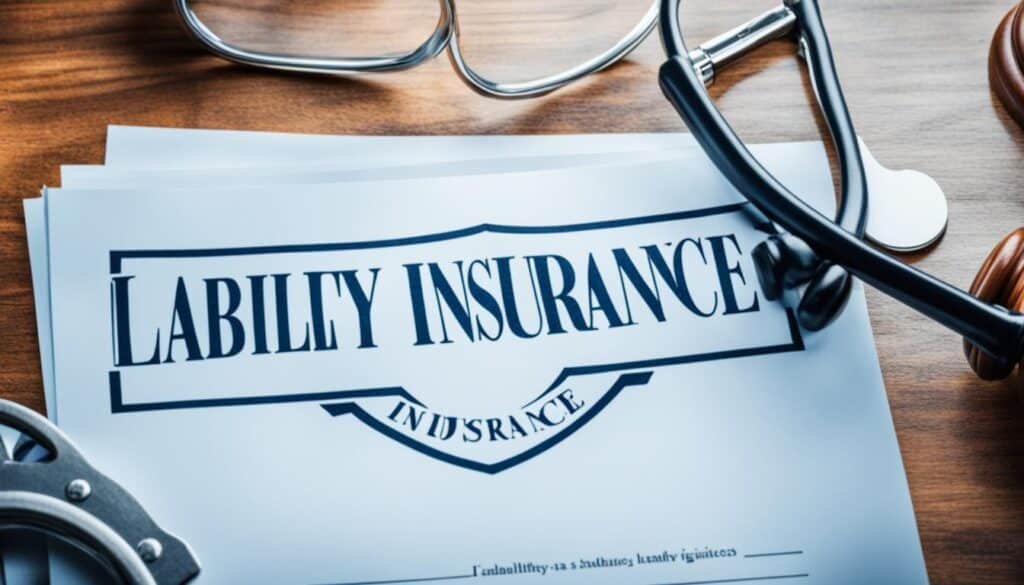Being an entrepreneur and starting your own small business can be an exhilarating journey. However, it also comes with its fair share of challenges and risks. That’s why having the right insurance coverage in place is crucial to protect your business and provide the flexibility needed to adapt and grow. Understanding the different aspects of small business insurance, including the various types of coverage and considerations for determining the appropriate coverage limits, is essential for safeguarding your venture and ensuring its long-term success.
Key Takeaways:
- Business liability insurance is necessary to protect your small business from risks and uncertainties.
- Understanding the different types of coverage and insurance options available is crucial in determining the right insurance for your business.
- Assessing your risk tolerance, contractual obligations, and specific business needs will help you make informed decisions when choosing business liability insurance.
- Working with an insurance agent specializing in commercial insurance can provide guidance and help you find the most competitive rates.
- Investing in business liability insurance is a wise decision that ensures the continuity and success of your small business.
Understanding Your Small Business Insurance Needs
Every business is unique, requiring different insurance coverage to address its specific needs. In this section, we will discuss two main categories of insurance that most businesses should consider: property insurance and liability insurance.
Property Insurance: Protecting Your Assets
Property insurance covers direct losses to the physical property you own or have a financial interest in. This includes buildings, equipment, stock, and other valuable assets. Whether it’s damage caused by fire, theft, or natural disasters, property insurance provides financial protection to help you recover and rebuild.
For example, if you own a small retail store and there is a fire, property insurance would cover the cost of repairs or rebuilding your store, replacing damaged inventory, and even the lost income during the restoration period. It safeguards your physical assets and ensures that unforeseen events don’t ruin your business.
Understanding the value of your assets and determining the appropriate coverage limits is crucial when considering property insurance. It’s important to conduct an assessment to identify high-value items that require comprehensive coverage and to self-insure or limit coverage for lower-value items.
Additionally, property insurance may also provide coverage for business interruption, loss of rent, and equipment breakdowns. It’s essential to review the policy details to ensure that your coverage aligns with your business’s unique risks and requirements.
Liability Insurance: Safeguarding Your Business against Legal Responsibility
Liability insurance protects your business from third-party losses for which you may be legally responsible. In other words, it covers damages or injuries caused by your business operations that result in financial liability.
For instance, if you are a contractor and accidentally damage a client’s property while working on a project, liability insurance would cover the cost of repairing the damages. It can also cover legal fees and settlements in the event of lawsuits resulting from bodily injury or property damage caused by your business. Having liability insurance ensures that your business is protected, even in situations where accidents or mistakes occur despite your best efforts.
Liability insurance typically includes different types of coverage to address various risks. General liability insurance provides broad coverage for common risks, such as bodily injury, property damage, and personal injury. Professional liability insurance, also known as errors and omissions insurance, is essential for service-based businesses or professionals who provide advice or services, protecting them from claims arising from their professional activities.
By having liability insurance, you mitigate the financial impact of legal claims and potential damage to your business’s reputation. It provides peace of mind, allowing you to focus on your core operations and growth without the constant worry of unexpected legal costs.
Next, we will dive deeper into the considerations for choosing the right insurance coverage and understanding the factors that impact the costs.
Property Insurance: Protecting Your Assets
When it comes to safeguarding your business, property insurance plays a crucial role in protecting your valuable assets. Whether you own a physical building, equipment, stock, or other valuable items, property insurance provides coverage for direct losses to these assets, giving you peace of mind in the face of unforeseen events.
When considering property insurance, it’s important to evaluate the value of your assets and determine the appropriate coverage limits. By assessing the worth of your property, you can tailor the insurance coverage to adequately protect your assets without overpaying for unnecessary coverage.
You may choose to carry insurance only on high-value property items, while opting to self-insure lower-value items. This strategic approach allows you to strike a balance between protection and cost-efficiency, ensuring that your insurance solution aligns with your risk tolerance and business needs.
In addition to safeguarding your physical assets, property insurance may also cover other related risks. Business interruption coverage, for example, helps protect against potential income loss due to events that temporarily halt regular operations, such as fire, natural disasters, or other unforeseen circumstances.
Similarly, loss of rent coverage can provide financial protection in situations where your business is unable to operate due to damage or other factors, while still having ongoing rent obligations. Additionally, property insurance can also offer coverage for equipment breakdowns, ensuring that your business operations can resume swiftly in case of vital equipment failures.
By choosing the right property insurance coverage and adequately assessing the coverage limits, you can safeguard your assets, protect against potential disruptions, and ensure the continuity of your business.
Liability Insurance: Safeguarding Against Legal Responsibility

When running a business, it’s crucial to understand and manage the potential risks and liabilities that come with it. Liability insurance provides vital protection for your business, safeguarding against third-party losses for which you may be legally responsible. It serves as a crucial safety net, offering coverage for property damage, bodily injury, personal injury, and damages resulting from your work or professional operations.
There are different types of liability insurance available to suit various business needs. Let’s explore some of them:
Bodily Injury Liability Insurance
Bodily injury liability insurance is a vital component of your liability coverage. It provides the necessary financial protection if someone is injured as a result of your business operations, products, or services. This coverage helps pay for medical expenses, lost wages, and other damages related to the bodily injury.
Property Damage Liability Insurance
Property damage liability insurance covers any damage caused to someone else’s property due to your business activities. Whether it’s accidentally damaging a customer’s belongings or causing harm to another person’s property while performing your services, this coverage ensures that you are protected from potential legal and financial consequences.
Professional Liability Insurance
Professional liability insurance, also known as errors and omissions insurance, is crucial for service-based businesses. It provides coverage for claims of negligence, errors, or omissions in the delivery of professional services. This type of insurance is particularly important for professions such as lawyers, doctors, consultants, and other service providers who may face legal action due to alleged professional misconduct or inadequate advice.
“Liability insurance is an essential safeguard for businesses, protecting them from the financial burden of legal claims and potential lawsuits. It offers peace of mind, allowing business owners to focus on their core operations and providing quality products and services.”
By investing in liability insurance, you are taking proactive steps to protect your business and its assets. It’s crucial to understand the specific coverage limits and exclusions of your policy to ensure comprehensive protection for your unique business needs. An insurance expert can help you navigate through the intricacies of liability insurance, ensuring that you have the right coverage to safeguard against legal responsibility.
Remember, accidents and unforeseen events can happen, but with liability insurance in place, you can mitigate potential risks and continue to operate your business confidently.
Factors to Consider When Choosing Small Business Insurance

Determining the right amount of insurance coverage and associated costs for your small business can be a complex process. There are several factors that you should consider to ensure you have the appropriate coverage to safeguard your venture effectively. These factors include:
Risk Tolerance
Your risk tolerance is an important consideration when determining your insurance coverage. Understanding your risk tolerance will help you evaluate the level of protection you need for your business. Assess the potential risks that your business may face and determine how much risk you are willing to take on. This will guide you in selecting the appropriate coverage limits and types of insurance policies.
Deductible Options
Choosing the right deductible option is another key factor in selecting small business insurance. A deductible is the amount you must pay out of pocket before your insurance coverage kicks in. Higher deductibles often result in lower insurance premiums, while lower deductibles mean higher premiums. Consider your business’s financial situation and evaluate the pros and cons of higher or lower deductibles to find the best fit for your needs.
Contractual Requirements
Reviewing contracts from an insurance perspective is essential to ensure compliance with any contractual requirements. Some agreements may stipulate specific insurance coverage or liability limits that you must adhere to. By thoroughly reviewing contracts, you can gain insights into the level of coverage required by specific agreements and ensure that you meet all contractual obligations.
| Factors to Consider | Description |
|---|---|
| Risk Tolerance | Determine your willingness to take on risks and select the appropriate coverage levels. |
| Deductible Options | Weigh the pros and cons of higher or lower deductibles to find the best fit for your financial situation. |
| Contractual Requirements | Review contracts to ensure compliance with any insurance-related obligations. |
By carefully considering your risk tolerance, deductible options, and contractual requirements, you can make informed decisions when choosing small business insurance. This will help you protect your venture effectively and minimize potential financial risks.
Protecting Your Small Business with the Right Insurance Coverage

Protecting your small business is crucial for long-term success and growth as an entrepreneur. With the right insurance coverage, you can safeguard your assets, mitigate liability risks, and ensure the continuity of your operations.
Assessing your specific needs and understanding the different types of coverage available is essential. Small business insurance provides comprehensive protection tailored to the unique risks faced by entrepreneurs.
Fulfilling your Small Business Insurance Needs
To protect your small business adequately, it’s vital to assess your specific needs and identify the types of coverage that best suit your operations. There are various insurance policies available to address different risks and provide the necessary financial security:
- General Liability Insurance: This type of insurance policy protects your business from claims related to bodily injury, property damage, and personal injury. It covers legal and financial consequences resulting from accidents that occur on your business premises or are caused by your products or services.
- Property Insurance: Property insurance safeguards your business assets, including buildings, equipment, and inventory, from damage or loss due to fire, theft, vandalism, or natural disasters. It provides financial coverage to repair or replace damaged property and helps ensure business continuity.
- Professional Liability Insurance: Also known as errors and omissions (E&O) insurance, professional liability insurance is crucial for service-based businesses. It protects you against claims of negligence, errors, or omissions in professional services that result in financial losses for your clients.
- Commercial Auto Insurance: If your business utilizes vehicles for transportation or deliveries, commercial auto insurance is essential. It provides coverage for accidents, injuries, and property damage involving company vehicles.
By understanding the scope of these insurance policies, you can select the ones that align with your business needs and ensure comprehensive coverage for your small business.
Maintaining Proper Documentation
When it comes to insurance, proper documentation is crucial. Having insurance policies and proof of insurance readily available is necessary to fulfill contractual requirements and provide peace of mind to your clients and partners. In case of an incident or a claim, having the necessary paperwork in place ensures a smooth process and helps protect your business.
You should keep copies of:
- Your insurance policies, including coverage details and effective dates
- Proof of insurance, such as certificates, to provide evidence of coverage to clients or partners as required
- Any endorsements or riders that modify or extend the coverage provided by your policies
Additionally, it’s essential to review your insurance policies periodically and make updates as needed to reflect any changes in your business operations or assets. Regularly communicating with your insurance provider can help ensure your coverage remains adequate over time.
Remember, small business insurance is a valuable investment that protects your business from unpredictable events and potential financial losses. By assessing your insurance needs, understanding the available coverage options, and maintaining proper documentation, you can secure the right insurance policies and protect your small business effectively.
The Importance of Insurance for Business Agility and Growth

General liability insurance plays a crucial role in protecting businesses from claims and unforeseen damages that could potentially cripple a small business. The coverage provided by general liability insurance protects against a wide range of liabilities, including bodily injury, property damage, and personal injury. In the event of an accident or incident, general liability insurance can help cover legal and financial consequences, ensuring that your business can continue to operate and grow without fear of significant financial loss.
One of the essential aspects of general liability insurance is determining the liability limit for your business. The liability limit represents the maximum amount an insurance company will pay for a liability claim. Choosing the right liability limit is vital to ensure that your business is adequately protected. Settling for a low liability limit may leave your business vulnerable to financial burdens if a claim exceeds the coverage amount. On the other hand, opting for a high liability limit can provide greater peace of mind.
It’s important to assess your business’s risk exposure and consider the potential costs associated with liability claims. Understanding your industry and the nature of your business operations can help you determine a suitable liability limit. Consulting with an insurance expert can provide valuable guidance in evaluating your business’s needs and selecting an appropriate liability limit that aligns with your risk tolerance.
By having the right general liability insurance and ensuring an adequate liability limit, your business can operate with confidence and pursue growth opportunities. With this essential protection in place, you can focus on the agility and expansion of your business, knowing that you are shielded from potentially devastating financial consequences.
Other Types of Business Insurance to Consider

In addition to property and liability insurance, there are other types of insurance that may be necessary for your business. It’s important to assess your specific business needs and consult with an insurance expert to determine the appropriate coverage for your industry and operations.
Workers’ Compensation Insurance
Workers’ compensation insurance provides benefits to employees who suffer work-related injuries or illnesses. It is designed to cover medical expenses, lost wages, and rehabilitation costs for injured employees. By having workers’ compensation insurance, you can protect your employees and your business from expensive legal claims and ensure that your workers receive the care they need.
Commercial Auto Insurance
If your business owns or uses vehicles for work purposes, it’s essential to have commercial auto insurance. This type of insurance protects your business from claims arising from accidents involving company-owned vehicles. Commercial auto insurance covers bodily injury, property damage, and other damages caused by the vehicles used in your business operations.
Cyber Liability Insurance
In the digital age, businesses face increasing cyber threats and data breaches. Cyber liability insurance safeguards your business against the financial and reputational damage caused by such incidents. It covers expenses related to data breaches, including legal fees, notification costs, and identity theft protection for affected individuals. Cyber liability insurance also helps manage the costs associated with restoring compromised data and systems.
By considering these types of insurance coverage, you can ensure that your business is adequately protected from various risks and potential financial losses. Consulting with an insurance expert will help you determine the appropriate coverage for your industry and operations.
Case Study: The Importance of Cyber Liability Insurance
“Our company fell victim to a major data breach, which compromised sensitive customer information. Without cyber liability insurance, we would have faced significant financial losses due to legal claims and customer compensation. Thanks to our insurance coverage, we received support in managing the breach, covering legal fees, and providing identity theft protection to affected individuals. It’s a valuable investment that protects our business and our customers.”
– John Smith, CEO of Tech Solutions Inc.
Understanding Small Business Insurance Costs

When it comes to protecting your small business, understanding the costs associated with insurance coverage is essential. The cost of small business insurance can vary depending on several factors that influence insurance premiums, such as the type of coverage, coverage limits, industry, and location. By considering these factors, you can make informed decisions to ensure your business is adequately protected without overspending on insurance.
One important factor that affects the cost of insurance is the type of coverage you choose. Various insurance policies cover different aspects of your business, such as general liability insurance, property insurance, and professional liability insurance. Each type of coverage carries its own cost considerations based on the risks associated with your specific business activities.
Another factor influencing insurance costs is the coverage limit. The coverage limit is the maximum amount that an insurance policy will pay for a covered loss. Higher coverage limits typically result in higher insurance premiums. It’s important to assess your business’s needs and risks to determine the appropriate coverage limit that balances financial protection and affordability.
The industry in which your business operates also plays a role in insurance premium calculations. Some industries are considered higher risk due to factors such as the nature of the work, the type of products or services provided, or the potential for third-party liability claims. Insurance companies factor in these risks when determining premiums, which can vary significantly from one industry to another.
Location is yet another consideration that impacts insurance costs. Certain geographic areas may be prone to natural disasters, crime rates, or other specific risks that would affect insurance premiums. Insurance companies consider these factors when evaluating the potential risks associated with your business’s location.
One effective way to manage insurance costs is to compare quotes from different insurance companies. By doing so, you can identify competitive pricing for the coverage you need. It’s important to note that while cost is a significant factor, it should not be the sole consideration. Ensure that the coverage being offered aligns with your business’s needs and risk profile.
Besides comparing quotes, implementing effective risk management strategies can help lower insurance costs over time. Insurance companies often provide discounts for businesses that maintain a safe working environment, have documented safety policies, and show a track record of responsible risk management practices. By prioritizing risk management, you can enhance workplace safety, reduce the likelihood of accidents or claims, and potentially qualify for lower insurance premiums.
Small Business Insurance Cost Considerations:
- The type of coverage you choose and the risks associated with your business
- The coverage limits you select to achieve the right balance of protection and affordability
- The industry in which your business operates and the potential risks involved
- The location of your business and any specific risks associated with the area
- Comparing quotes from different insurance companies to find competitive pricing
- Implementing effective risk management strategies to lower insurance costs over time
It’s important to remember that while insurance is a necessary expense for protecting your business, the cost should be viewed as an investment in safeguarding your long-term success and mitigating financial risks. By carefully considering the factors that influence insurance premiums and working with knowledgeable insurance professionals, you can find the right coverage at a competitive price, ensuring the financial security of your small business.
Navigating the Insurance Market for Small Businesses

When it comes to finding the right insurance coverage for your small business, partnering with an experienced insurance agent is highly recommended. An insurance agent specializing in commercial insurance can provide valuable insights, assess your unique needs, and guide you through the complex insurance market.
Working with an insurance agent offers numerous advantages. They have in-depth knowledge of the insurance industry and can help you find the most suitable coverage for your business. Insurance agents have access to multiple insurance companies, allowing them to obtain quotes and compare coverage options on your behalf.
One of the essential steps in securing insurance for your small business is obtaining a general liability insurance quote. This quote provides you with an estimate of the cost and coverage details for general liability insurance, which protects your business from claims related to property damage, bodily injury, and personal injury.
“Partnering with an insurance agent ensures you receive competitive rates and comprehensive coverage tailored to your specific business needs.”
Comparing different general liability insurance quotes enables you to make an informed decision based on your budget and risk exposure. It allows you to understand the coverage options available and identify the best insurance solution for your small business.
An insurance agent can also assist you in navigating the insurance market by explaining complex insurance terminology, clarifying policy exclusions and limitations, and addressing any questions or concerns you may have.
Remember, insurance is a vital tool to protect your business and mitigate potential risks. By working with an insurance agent and obtaining general liability insurance quotes, you can ensure your small business has the necessary coverage to operate confidently and safeguard its future.
Whether you need coverage for property damage or liability claims, an insurance agent can be your trusted advisor in finding the right insurance solution. Don’t hesitate to reach out to a reputable insurance agent to navigate the insurance market and provide optimal protection for your small business.
Protecting Your Business with Insurance: A Wise Investment

Investing in business liability insurance and other types of coverage is a wise investment for small businesses. As an entrepreneur, you work hard to build and grow your venture, and it’s essential to take steps to protect it from unexpected risks and potential financial losses.
By securing the right insurance coverage, you can safeguard your business and ensure its long-term success. Small business protection is not just about mitigating risks; it’s about securing peace of mind and creating a solid foundation for future growth.
One of the main benefits of business liability insurance is that it offers protection against unforeseen risks that could have a significant impact on your company’s finances. Whether it’s a liability claim, property damage, or bodily injury, having the right insurance coverage can help you weather these unforeseen events and prevent them from derailing your operations.
Effective risk management solutions are another crucial aspect of protecting your business. By identifying potential risks and implementing strategies to mitigate them, you can reduce the likelihood of accidents and losses. This could include implementing safety protocols, training employees on risk management practices, and staying informed about industry regulations and best practices.
Partnering with knowledgeable insurance professionals is also essential for small business protection. Insurance agents who specialize in commercial insurance can offer guidance on the right types and levels of coverage for your specific industry and operations. They can help you understand the intricacies of insurance policies, assist with claims, and provide ongoing support to ensure that your business remains adequately protected.
In summary, protecting your business with insurance is a wise investment. By obtaining business liability insurance and implementing risk management solutions, you can safeguard your venture against unexpected risks, maintain business continuity, and mitigate financial losses that could otherwise jeopardize your company’s success. Don’t underestimate the importance of small business protection – invest in insurance and secure the future of your business.
Also Read : Secure Your Home With Affordable Home Insurance
Conclusion
In conclusion, business liability insurance is a vital component of protecting your venture and ensuring its long-term success. As an entrepreneur, it’s crucial to understand your small business insurance needs, such as property insurance and liability insurance.
When choosing insurance coverage for your business, there are several factors to consider. It’s important to assess your risk tolerance, evaluate deductible options, and review contractual requirements. These considerations will help you secure the right insurance coverage that aligns with your specific needs.
By working with an insurance expert, you can navigate the complexities of small business insurance and make informed decisions. Their expertise will help you protect your assets, mitigate liability risks, and confidently overcome the challenges of entrepreneurship.
FAQs
Q: What is general liability insurance?
A: General liability insurance is a type of coverage that protects businesses from financial losses resulting from claims of property damage, bodily injury, and other related incidents.
Q: Why do businesses need general liability insurance?
A: Businesses need general liability insurance to safeguard their assets and protect themselves from potential lawsuits or claims that may arise from third parties.
Q: How can I get a general liability insurance quote?
A: You can obtain a general liability insurance quote by reaching out to insurance providers or brokers who specialize in offering coverage for small businesses.
Q: What does general liability insurance for small businesses cover?
A: General liability insurance for small businesses typically covers property damage, bodily injury, advertising injury, and legal defense costs associated with covered claims.
Q: Can general liability insurance help protect my small business from claims?
A: Yes, general liability insurance can help protect your small business from claims related to property damage, bodily injury, and advertising injury that may occur during business operations.
Q: How do I purchase general liability insurance for my business?
A: You can purchase general liability insurance for your business by contacting insurance providers, brokers, or online platforms that offer policies tailored to meet your specific needs.
Q: What is a general liability claim?
A: A general liability claim refers to a request for compensation or legal action made against a business for alleged property damage, bodily injury, or other covered incidents.
Q: What is business liability insurance?
A: Business liability insurance, also known as general liability insurance, provides coverage for a business in case of third-party claims of bodily injury, property damage, or personal injury.
Q: Why do I need business liability insurance?
A: Business liability insurance is important for protecting your venture from potential financial losses due to lawsuits or claims by third parties.
Q: How do I get general liability insurance for my business?
A: To get general liability insurance for your business, you can reach out to insurance providers or agents who offer commercial general liability insurance coverage.
Q: What does business liability insurance cover?
A: Business liability insurance coverage typically includes legal costs, settlements, and judgments that arise from covered claims under the policy.
Q: How can I provide proof of insurance to my clients?
A: You can provide proof of insurance to your clients by obtaining a certificate of insurance from your insurance provider, which outlines your coverage details.
Q: How can liability insurance help my small business?
A: Liability insurance can help protect your small business from financial losses that may occur due to legal liabilities arising from accidents or other unforeseen events.
Q: What are some common questions about general liability insurance?
A: Common questions about general liability insurance include what it covers, how to obtain it, and why it is essential for businesses to have this type of coverage.
Source Links
- https://www.thehartford.com/small-business-insurance/what-insurance-do-you-need-for-small-business
- https://www.linkedin.com/pulse/small-business-insurance-protect-your-venture
- https://kofirm.com/the-basics-of-protecting-your-business-with-insurance




